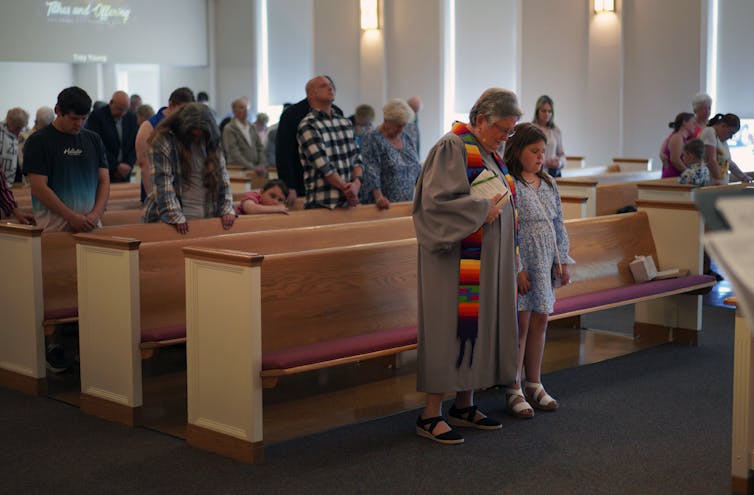Southern Baptists expel churches with women pastors – but the debate’s not just about gender
In Southern Baptist history, rules on women and sexuality are often entwined. A scholar writes about the first congregation to be expelled from the SBC over LGBTQ+ issues

The Southern Baptist Convention, the largest Protestant group in the United States, overwhelmingly voted to expel two congregations with women pastors on June 14, 2023, during their annual convention.
SBC messengers, as convention delegates are called, also put forward an amendment to make churches’ membership within the denomination contingent upon prohibiting women pastors, which will be voted on next year.
Media coverage of this debate has focused on gender. However, as a scholar of Baptists in the U.S., I believe an underlying conversation about sexuality has also shaped the church’s opposition to women preaching.
A denomination’s decisions about one social issue often influence its position on others, as I have written about with sociologist Gerardo Marti. We argue that the SBC’s stance on issues of gender and sexuality have not always been just about fidelity to their interpretation of scripture. Rather, the SBC uses these issues to differentiate itself from other, more progressive denominations.
My recent book, “Binkley: A Congregational History,” examines the history of one of the first congregations to be expelled from the SBC over the issue of sexuality, in 1992.
Gay and called
In 1990, a Duke Divinity School student named John Blevins, who was openly gay, began attending the Olin T. Binkley Memorial Baptist Church in Chapel Hill, North Carolina. After his first year of Divinity School, he approached the church about the possibility of being ordained.
Blevins was drawn to Binkley for its progressive theology. Founded in 1958, the church became an interracial congregation and supported the Civil Rights Movement at a time when many Southern Baptist churches prohibited Black worshippers from becoming members or even attending Sunday services. Later, the congregation called women to serve as associate pastors and, ultimately, senior pastor as well.
Blevins’ request for ordination raised questions among some of Binkley’s leaders and members. Between 1976 and 1991, the SBC had passed six resolutions on homosexuality. The first encouraged congregations “not to afford the practice of homosexuality any degree of approval through ordination, employment, or other designations of normal life-style.” Subsequent resolutions grew increasing harsh. In 1988, the SBC passed a resolution that declared homosexuality an “abomination in the sight of God.”
Convention resolutions are not binding on individual congregations, however, and many members of Binkley thought about sexuality differently. Senior pastor Linda Jordan thought that since Blevins was still completing his divinity degree, the church should license him to preach, but wait to formally ordain – meaning he could not preside over communion or weddings, nor hold the title of Reverend.
The church went through a yearlong process of studying faith and sexuality as members wrestled with Blevins’ request. In April 1992, the congregation voted to license Blevins to preach the Gospel.
Removal from the SBC
That same year, in Raleigh, North Carolina, Pullen Memorial Baptist Church held a ceremony to honor a same-sex union. As Pullen’s pastor Mahan Siler reflected in 2022, it was a first: “there wasn’t a congregation we knew out there who we could learn from.”
Both congregations’ decisions drew the ire of the North Carolina Baptist Convention, as well as the national convention of the SBC, where messengers voted to expel both churches. Minutes from the meeting note that the crowd burst into the “appearance of elation” at the decision.
Messengers proceeded to propose an amendment that congregations “which act to affirm, approve or endorse homosexual behavior” would not be “in friendly cooperation with the Convention.” It was adopted the following year.
Barring membership to the SBC over the issue of sexuality presented an opportunity for conservatives who also opposed women’s leadership. During the same meeting, in 1993, another proposed amendment sought to prohibit the membership of churches that ordained women.
The proposal failed before being put to a convention-wide vote. Yet it shows how issues of sexuality and gender were entwined for conservative members of the SBC, who sought similar constitutional amendments for both. One amendment created the opportunity for the other.

‘Logical consequence’
The amendment the SBC is currently considering, which seeks to prohibit women pastors, acknowledges this history.
Mike Law, the Virginia pastor who proposed the amendment, does not seek to block women from ordination, as the proposal put forward in 1993 would have done. Rather, his amendment seeks to block women from holding the title of “pastor”. This distinction would allow women to be ordained and serve as other types of church leaders, such as deacons or missionaries.
In a series of videos he released before the vote, Law described the issue of women pastors as a “canary in the coal mine.” “Once a denomination allows female pastors it’s usually just a matter of time until they affirm practicing homosexuals as pastors,” he said.
Al Mohler, president of the Southern Baptist Theological Seminary, offered a similar concern on his blog in 2018. “The same negotiation and ‘reinterpretation’ of the biblical text that allows for the service of women pastors will logically lead to the acceptance of the LGBT revolution,” he argued.
Both men, in other words, believe one kind of acceptance leads inevitably to the other – the proverbial slippery slope. The SBC’s history suggests that “slippery slope” could easily cut the other way, too: Once a denomination rejects gay pastors, it may only be a matter of time until it rejects women pastors, too.
Either way, when the SBC is wrestling with issues of gender, issues of sexuality are not too far away.
Andrew Gardner does not work for, consult, own shares in or receive funding from any company or organisation that would benefit from this article, and has disclosed no relevant affiliations beyond their academic appointment.
Read These Next
Why Stephen Colbert is right about the ‘equal time’ rule, despite warnings from the FCC
The ‘equal time’ rule has been around for a century and aims to promote broadcasters’ editorial…
As war in Ukraine enters a 5th year, will the ‘Putin consensus’ among Russians hold?
Polling in Russia suggests strong support for President Vladimir Putin. Yet below the surface, popular…
How Dracula became a red-hot lover
Count Dracula was originally a rank-breathed predator. His transformation into a tragic romantic mirrors…






